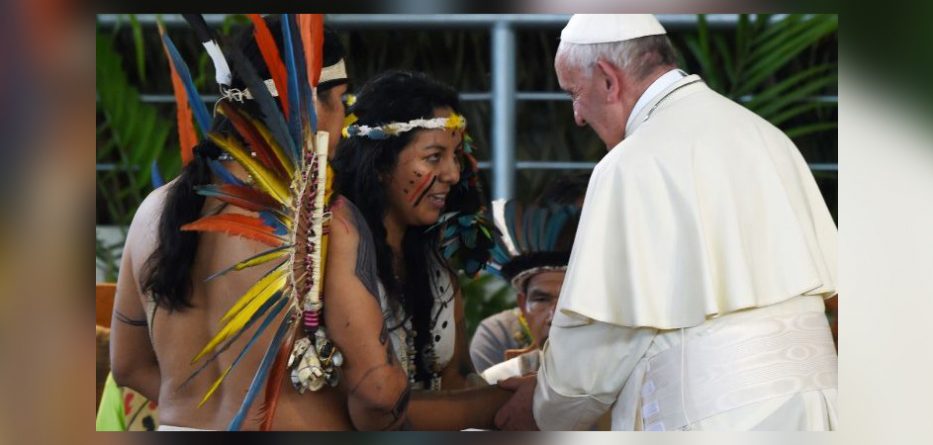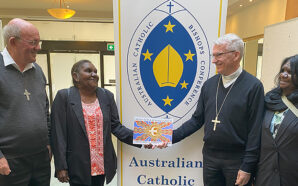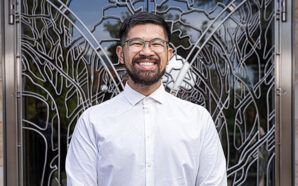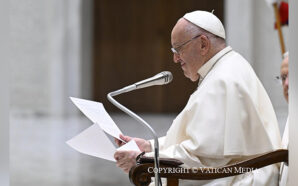Bishop Stephen Lowe reflects on Querida Amazonia – Pope Francis’ post-synodal apostolic exhortation on the Amazon.
Pope Francis’ 2015 encyclical letter Laudato Si’, on care for our common home, the earth, continued the tradition of the prophets and of popes before him who have spoken out on global concerns – such as Pope St John XXIII’s Pacem in Terris on world peace when the world sat on the knife edge of nuclear war; and Pope St John Paul II’s Evangelium Vitae on the value and inviolability of human life in the face of a culture of death.
In the face of worsening global environmental and social issues, Laudato Si’ raised the concept of “integral ecology” which reminds us that everything is connected. “Nature cannot be regarded as something separate from ourselves or as a mere setting in which we live. We are part of nature, included in it and thus in constant interaction with it” (LS 138), Pope Francis wrote. Everything we do in terms of the environment, our economic activity, our society and our culture is connected and impacts on each other.
In February, Pope Francis issued what might be considered as a case study of Laudato Si’. Querida Amazonia is the fruit and gift to the Church of Pope Francis’ reflection on the Amazonian Synod held in Rome last year.
The Holy Father defines the Amazon region as “a multinational and interconnected whole, a great biome shared by nine countries…”Yet, he writes, “I am addressing the present exhortation to the whole world. I am doing so to help awaken their affection and concern for that land which is also ‘ours’, and to invite them to value it and acknowledge it as a sacred mystery” (QA 5).
At the end of the synod, the people representing the Amazon and their bishops described the Amazon as “a wounded and deformed beauty, a place of suffering and violence”. They expressed their concerns at the destruction of the forests and pollution of the rivers, the consequences for the people – including sexual exploitation, human trafficking and smuggling, organ traffic, sex tourism, the loss of original culture and identity of the peoples of the Amazon as their land and being is stolen and destroyed.
As it happened, the New Zealand bishops met Pope Francis the day after the synod had concluded and he shared with us some of his reflections on the synod. In our conversation with Pope Francis, we easily made the connection between the issues raised by the synod and the arrival of Pākehā in Aotearoa New Zealand and the impact this had on Māori and on the whenua, the land.
In Querida Amazonia, Pope Francis writes: “The original peoples often witnessed helplessly the destruction of the natural surroundings that enabled them to be nourished and kept healthy, to survive and to preserve a way of life in a culture which gave them identity and meaning. The imbalance of power is enormous; the weak have no means of defending themselves, while the winners take it all, and ‘the needy nations grow more destitute, while the rich nations become even richer’ (cf. Populorum Progressio), (QA 13)”. What he wrote of the Amazon today might have been written of Aotearoa New Zealand from the mid-1800s to this day.
Querida Amazonia shares Pope Francis’ dreams for the Amazon. He uses poetry and wisdom from the Amazon to paint a picture of what might be rather than impose western or first world solutions upon one of the most fragile areas of the planet. He writes:
- “I dream of an Amazon region that fights for the rights of the poor, the original peoples and the least of our brothers and sisters, where their voices can be heard and their dignity advanced.
- “I dream of an Amazon region that can preserve its distinctive cultural riches, where the beauty of our humanity shines forth in so many varied ways.
- “I dream of an Amazon region that can jealously preserve its overwhelming natural beauty and the super-abundant life teeming in its rivers and forests.
- “I dream of Christian communities capable of generous commitment, incarnate in the Amazon region, and giving the Church new faces with Amazonian features.” (QA 7)
For us in Aotearoa New Zealand, Querida Amazonia offers us an opportunity to reflect on what has happened in our own land and to consider new paths for the future, reflecting with Māori on the sacred taonga that are our land, our rivers and lakes, our mountains and sea, and most importantly, the tangata, our people. Pope Francis speaks of combining ancestral wisdom with contemporary technical knowledge, always working for a sustainable management of the land while also preserving the lifestyle and value systems of those who live there (cf. QA 51) and that, from the original peoples, we can learn to contemplate the precious mystery that transcends us. We can love it, not simply use it, with the result that love can awaken a deep and sincere interest. Even more, we can feel intimately a part of it and not only defend it; then the Amazon region will once more become like a mother to us (cf QA 55). What he says of the Amazon can be true for us in Aotearoa New Zealand.
Often today there can be criticism of how the Gospel was announced to indigenous peoples by colonial powers and the Holy Father apologises again for the Church’s sins of the past in the Amazon. But as Jesus stepped into a culture, a people, so too the Church stepped into cultures; it takes flesh in all peoples, for the mission of the Church is inviting people to a friendship with the Lord that can elevate and dignify them (cf QA 61).
Pope Francis stresses an Amazonian face for the Church in the Amazon. “A fruitful process takes place when the Gospel takes root in a given place, he writes, but at the same time the Church herself undergoes a process of reception that enriches her with the fruits of what the Spirit has already mysteriously sown in that culture. In this way, “the Holy Spirit adorns the Church, showing her new aspects of revelation and giving her a new face. The history of the Church shows that Christianity does not have simply one cultural expression”(cf. QA 68, 69).
In our local Church, Bishop Pompallier was a master at bridging the gap between Māori spirituality and Catholic theology and spirituality, and this enabled the tupuna (ancestors) of many of our Māori community to accept the Catholic faith. But Pope Francis reminds us this needs to be an ongoing process in the Church in Aotearoa New Zealand.
Querida Amazonia can become for us, then, a real gift, and an opportunity not only to stand in solidarity with our sisters and brothers in the Amazon, but it can also become an impetus for us to reflect on the face of the Church in Aotearoa New Zealand.
We are invited to live out Pope Francis’ dream of a Church that stands with the poor, that embraces the cultural riches of Māori as a taonga that can give a distinctively Kiwi face to the local Church in the wider universal Church and that contemplates the beauty of our land and sea as a sacred gift of God entrusted to our care, for us and for our future tamariki and mokopuna (children and grandchildren).
Bishop Stephen Lowe is Bishop of Hamilton. He is also secretary of the New Zealand Catholic Bishops Conference.
Reproduced with permission from NZ Catholic, the national Catholic newspaper of New Zealand, published by the Catholic Bishop of Auckland.








